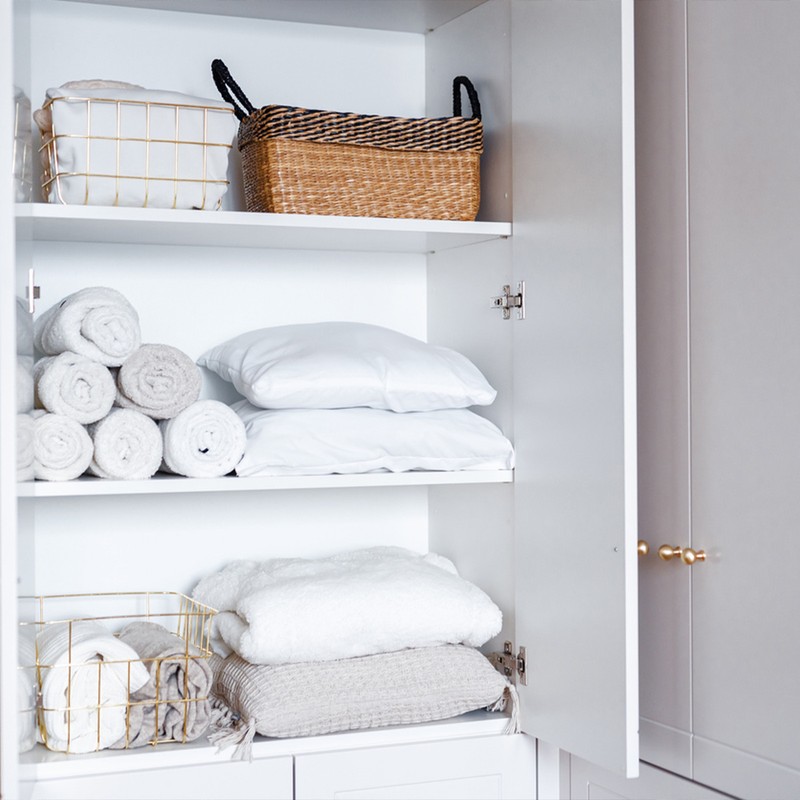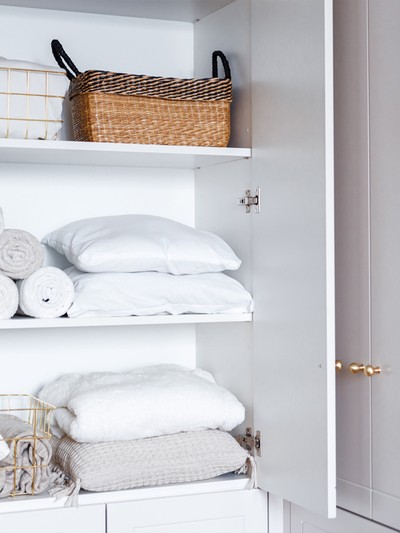

How To Clean & Declutter Your Home In Time For Spring
Find Your Motivation
“If you’re not someone who cleans naturally, you need to find your motivating factor. Your reasons for decluttering may not be the same ones that motivate other people. Ask yourself what currently frustrates you about the clutter and work out what the benefits of decluttering would be. Hold onto this as you make a start. Preparation is also key – you will need bags (bin bags, supermarket bags and/or recycling bags), labels and a pen. That said, don’t go crazy with investing in too much storage too soon – often, people buy organising solutions before they’ve properly decluttered. However, the problem of having too much stuff in the first place hasn’t been fixed. So wait until you have decluttered, then measure the space before you buy organising products. From there, invest in drawer dividers to organise items in drawers, containers for grouping items on shelves and shelf inserts for maximising space.” – Lizzie Grant, professional organiser & founder of Declutter on Demand
Break Down The Key Tasks
“Don’t feel you have to do it all at once. The best thing to do is to break the project up into small sections and do one section at a time. So, if you’re doing the kitchen, start with the drawers. The next day or next week, do some of the cupboards. If it’s the bedroom, do the clothes first, then shoes, then bags and so on. This way the task feels less challenging and daunting. If you’re really feeling daunted, think small to start with. As mentioned, do things like drawers first, then the cupboards, then floor cupboards and finish with worktops and surfaces. The reason I say do the worktop surface last – even if that can feel messy – is because when you have done everything else, there should be places to put that stuff in. If not, try to make space for things like papers, pens, and other items that normally clutter your surfaces.” – Maria Syrrist, decluttering & organising consultant at Free Up Zone
Separate Yourself From Sentimentality
“You don’t have to hang onto things to hang onto the memory. For grandchildren’s artwork, for example, take photographs and then recycle the rest. You don’t need to keep that canvas with one feather stuck to it! Also, use a multi-picture frame which you can add artwork to as they do it. That way, the best pieces can be kept but they don’t take up too much space.” – Kathryn Lord, organising coach
“It’s really common for people to hold on to things they have been gifted out of guilt, even though they do not like or need them. However, give yourself permission to donate, sell or re-gift presents. The thing about gifts is this: once given to you, the gift is yours to do with as you wish. So, if you want to let go of them, you can. Another mistake is people remember how much money they spent on their belongings (often clothes) which they have never used (and probably never will). This guilt of feeling they have wasted their money makes it hard for them to let go of these items. It can be more helpful to remember that we all sometimes spend money in less-than-ideal ways. All we can do is move forward and do better next time.” – Lizzie
Be Brutal
“My advice is divide items into four piles: Keep, Action (e.g. dry-clean or repair), Donate and Recycle. Have labelled bags ready for your different piles so you can put items straight into them, which means you’re less likely to second-guess yourself. To decide what to keep and let go of, ask yourself questions like: do I love it and use it? If not, why not? Would you buy it again now? What purpose does it serve in your life? Does it make you feel positive or negative? Do you have something else that serves the same purpose and which you prefer?” – Lizzie
“If you feel like ‘stuff’ is taking over your house, the best thing to do is to go through each item and really ask yourself why are you keeping it – are you keeping it because you feel guilty getting rid of it? If that is the case, it is much better to give it to charity. You may need support from family members to let go of certain sentimental items – discuss with your family whether the item is something that should stay in the family and whether anyone else wants to take care of it.” – Maria
Don’t Let Anywhere Be A Dumping Ground
“Areas like garages so often become a dumping ground for all sorts of items. The trick is to decide what types of items really need to be stored in there. Declutter anything you no longer need or want. You may find a lot of things which need to be taken to the tip or picked up by a waste collection company to be recycled. Create zones so that you know exactly where to go to find things like DIY tools, Christmas decorations, gardening items etc.” – Lizzie
“Label everything. Take out the guesswork so you don’t have to go into every box or container every time to know exactly what’s in there. You could also use labels with photographs on them so small children and people who don’t live in your home know what is where. Colour co-ordinating items is another good hack. It means everyone – children included – know instinctively what belongs where and why.” – Kathryn
“I like reusing old jars or containers to create more storage. If you’ve got old food jars lying around, give them a wash and use them as storage pots for leftovers, dried food or snacks. Why not take off the labels and rename them too? I use my Cricut Joy label maker to label all my jars and containers so that everything has its place. Try organising your kitchen like a shop, too. Post-Christmas, rearrange your cupboards so that you have items with the closest use-by date at the front, and push items with longer dates to the back. Then, whenever you do a shop, put the new items at the back. And if you find food that’s about to reach its use-by date that you can’t use, take it to a food bank.” - Vicky Silverthorn, professional organiser
Avoid These Common Mistakes
“Many people assume that when it comes to household cleaners, more equals better. However, this simply isn’t the case. Using too much product can oversaturate cleaning materials, like microfibre cloths, which can leave streaks. In addition, you’ll spend more time cleaning overspray than you will windows, countertops or baseboards. Remember a little cleaning solution goes a long way, and that it’s easier to add more cleaner than to mop up excess.” – the team at cleaning service Merry Maids
“Some surfaces need to be cleaned carefully and spraying a cleaner directly onto it can be too harsh or too wet. Spraying cleaners onto a surface also releases more of the cleaner into the air, which can be irritating to people with asthma or allergies. Instead, spray your cleaner onto a cleaning cloth, then wipe the surface. Also, if your vacuum canister is constantly packed full of dust and dirt, it’s probably impeding your vacuum’s airflow. This can wear out your vacuum’s motor over time, to the point where it eventually loses suction altogether. Instead, just make it a habit to empty the canister every time you use your vacuum. It may not be strictly necessary but, once it’s a habit, you won’t have to worry about forgetting to do it.” – Jill Nystul, household expert
Try These Unusual Hacks
“To soften splatters inside the microwave, fill a cup with water and microwave on high for a few minutes. The steam will loosen any baked-on food so you can wipe it clean easily. Also, use a cloth on the end of a mop handle to reach the narrow space between appliances. Baking soda is also safe enough to clean and disinfect counters, sinks, cutting boards, major and minor appliances, plastic containers, and more. Simply sprinkle about half a teaspoon on a damp sponge or cloth and wipe your surfaces clean, rinse thoroughly, then dry. To remove fingerprints from stainless steel appliances, add a small amount of baby oil to a clean, soft microfibre cloth and wipe. You can also use a toothbrush to clean hard-to-reach areas around soap holders, taps and drains.” – the Molly Maid team
“After cleaning your bin with a disinfectant spray, douse a piece of kitchen roll in Zoflora, fold it up and leaves it at the bottom before inserting a new bin bag. It will counteract any odours until you next remove the bag. You can also use a tumble dryer sheet to wipe away any dust or grime that’s built up on both real and artificial plants. It will keep them smelling fresh and avoid a build-up of grime that could then transfer onto your carpet or furniture. Finally, use fabric conditioner to keep the paintwork on your doors clean. Mix a cup with water to wipe down marks without removing the paint” – Mrs Hinch
Get The Family Involved
“It’s best to lead by example if your family aren’t that organised or supportive of your decluttering drive. You need to encourage them to learn to follow your habits and help them become naturally ingrained, too. It’s harder to pick up these habits as we get older, so the sooner you can positively reinforce the behaviour, the better.” – Kathryn
“Develop new habits. It can often take developing different habits to prevent clutter creeping back over time. Start a new habit so that at the same time every day you take time to put things back where they belong and to sort out little bits of clutter. That way you keep on top of things as you go and can maintain a clear space long term.” – Lizzie
Finally, Draft In A Professional To Help
“It’s definitely worth hiring a professional organiser to help, as it will make the process more enjoyable and less overwhelming. It will also help keep you motivated and accountable, meaning you actually finish the project. Professional organisers provide both a practical helping hand and empathetic, non-judgemental support through what can be an emotional process. Their services include helping clients down-sizing to declutter and organise pre-move and then unpack and organise into their new home; helping clients or families with hoarding tendencies to declutter; working with those who have suffered a bereavement to declutter their loved one’s possessions. They help declutter and organise any area of the home from attics to basements and any category of belongings including clothes, paperwork and photos.” – Lizzie
For more information visit DeclutterOnDemand.com, MollyMaid.co.uk, FreeUpZone.com, YouNeedAVicky.com, MerryMaids.com, OneGoodThingByJillee.com, and follow @More_To_Organising and @MrsHinchHome on Instagram.
DISCLAIMER: We endeavour to always credit the correct original source of every image we use. If you think a credit may be incorrect, please contact us at info@sheerluxe.com.

